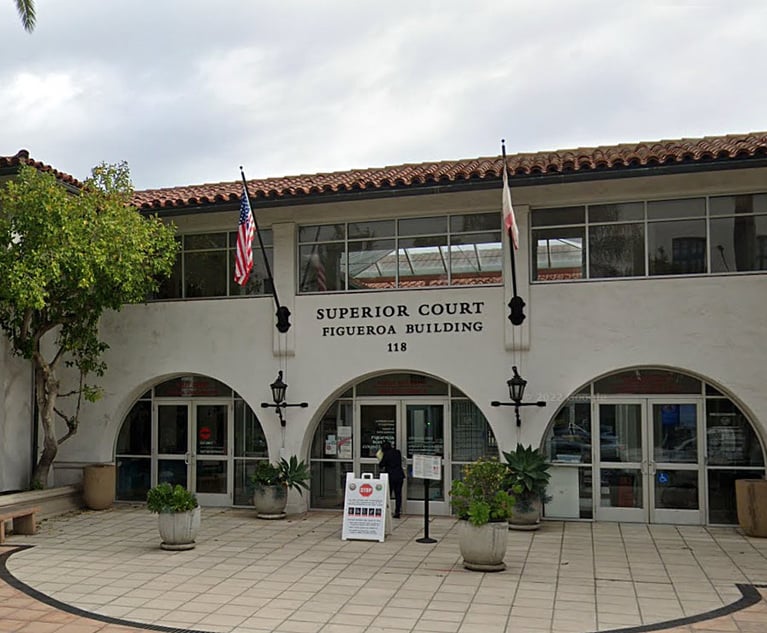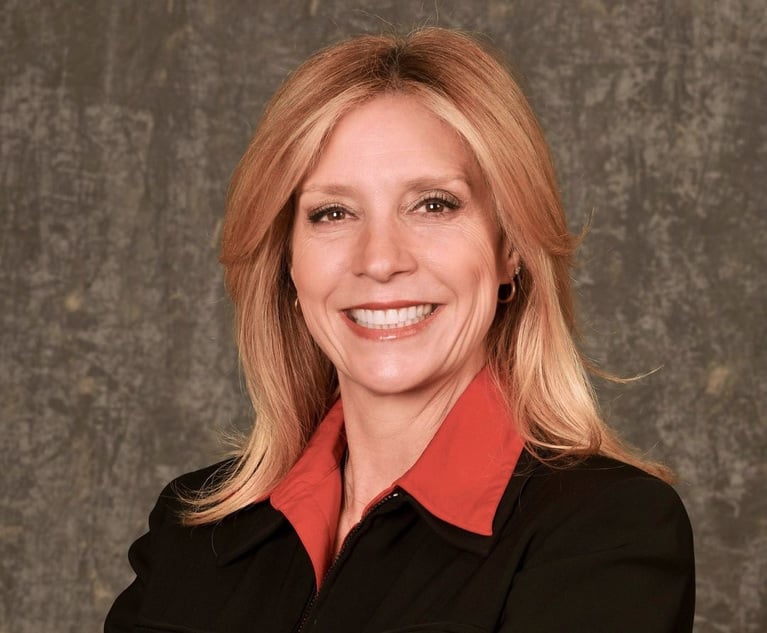 Kannon Shanmugam of Paul Weiss speaks at a Federalist Society event. Photo: Diego M. Radzinschi/ALM
Kannon Shanmugam of Paul Weiss speaks at a Federalist Society event. Photo: Diego M. Radzinschi/ALMPaul Weiss Asks SCOTUS to Confront 'Arbitration-Hostile' California
Paul Weiss partner Kannon Shanmugam told the justices in a newly-filed cert petition: "The California Supreme Court once again thumbed its nose at the Federal Arbitration Act and this court."
January 13, 2020 at 05:47 PM
4 minute read
The original version of this story was published on National Law Journal
A California Supreme Court ruling in a wage dispute threatens to undermine "millions of arbitration agreements" and more broadly highlights the state's "recalcitrance" against allowing employers and their workers to resolve some workplace complaints out of court, lawyers for an auto dealer asserted in a new U.S. Supreme Court on Monday.
The petition, filed by a team from Paul, Weiss, Rifkind, Wharton & Garrison, said a series of California rulings against arbitration agreements have made the state a "serial offender" of U.S. Supreme Court decisions upholding mandates of the Federal Arbitration Act.
"The message has not gotten through," Paul Weiss partner Kannon Shanmugam told the justices on behalf of OTO LLC, which does business as One Toyota of Oakland. Paul Weiss represents the auto dealer with the law firm Fine, Boggs & Perkins.
The Supreme Court over the last decade has issued a number of rulings strengthening the Federal Arbitration Act, and the new petition gives the justices a fresh opportunity to weigh the contours of the law. The justices last term passed up a chance to take a California arbitration case, as the high court, without comment, refused to touch a state ruling that said a former Winston & Strawn partner could sue the firm for alleged bias.
The auto dealer's petition challenges a divided California Supreme Court opinion that invalidated an arbitration agreement in a dispute involving a former service technician. The auto dealer's lawyers unsuccessfully tried to stop a California labor agency hearing, and the company also lost its bid to compel arbitration through the courts. The California Labor Commission awarded the former employee, Ken Kho, $150,000 in unpaid wages, liquidated damages, interest and penalties.
Kho's lawyer in the California Supreme Court, David Rosenfeld of Weinberg, Roger & Rosenfeld, was not immediately reached for comment Monday.
The California Supreme Court concluded the arbitration agreement at question was "substantively unconscionable." Arbitration, the court said, "is premised on the parties' mutual consent, not coercion."
The justices in the majority said that by signing the arbitration agreement, Kho surrendered a "full panoply" of administrative procedures and assistance and got in return access "to a formal and highly structured arbitration process that closely resembled civil litigation if he could figure out how to avail himself of its benefits and avoid its pitfalls."
"Employees who agree to arbitrate claims for unpaid wages forgo not just their right to litigate in court, but also their resort to an expedient, largely cost-free administrative procedure," the California Supreme Court said. The ruling described Kho's arbitration agreement as "opaque." Sentences in the agreement "are complex, filled with statutory references and legal jargon. The second sentence alone is 12 lines long."
The ruling in Kho's case attracted widespread attention in labor and employment circles. Lawyers at the management-side firm Fisher & Phillips said in a blog post that the decision "casts doubt on—and in some cases even condemns—some of the most common practices used by employers in drafting and presenting arbitration agreements to their employees."
The Paul Weiss lawyers argued in their petition that the California Supreme Court ruling, left to stand, "will have an enormous practical impact on California employers and employees." The petition asserted that California employers "must either accept the risk that their existing agreements will not be enforced, or renegotiate the terms of those agreements to comply with the California Supreme Court's decision."
"In its zeal to undercut arbitration, the California Supreme Court reached a preposterous result—deeming an arbitration agreement substantively unconscionable on the perverse ground that it offered too many of the protections of civil litigation," Shanmugam wrote. He argued the decision, if it remains in place, "will undermine millions of arbitration agreements in the most populous state in the nation."
Shanmugam told the justices: "The California Supreme Court once again thumbed its nose at the Federal Arbitration Act and this court, ignoring the court's clear and repeated mandates that the FAA preempts state rules that discriminate against arbitration."
This content has been archived. It is available through our partners, LexisNexis® and Bloomberg Law.
To view this content, please continue to their sites.
Not a Lexis Subscriber?
Subscribe Now
Not a Bloomberg Law Subscriber?
Subscribe Now
NOT FOR REPRINT
© 2024 ALM Global, LLC, All Rights Reserved. Request academic re-use from www.copyright.com. All other uses, submit a request to [email protected]. For more information visit Asset & Logo Licensing.
You Might Like
View All


Santa Barbara Judge Accused of Moonlighting as Attorney for Secretary/Girlfriend
4 minute readLaw Firms Mentioned
Trending Stories
- 1Decision of the Day: Judge Reduces $287M Jury Verdict Against Harley-Davidson in Wrongful Death Suit
- 2Kirkland to Covington: 2024's International Chart Toppers and Award Winners
- 3Decision of the Day: Judge Denies Summary Judgment Motions in Suit by Runner Injured in Brooklyn Bridge Park
- 4KISS, Profit Motive and Foreign Currency Contracts
- 512 Days of … Web Analytics
Who Got The Work
Michael G. Bongiorno, Andrew Scott Dulberg and Elizabeth E. Driscoll from Wilmer Cutler Pickering Hale and Dorr have stepped in to represent Symbotic Inc., an A.I.-enabled technology platform that focuses on increasing supply chain efficiency, and other defendants in a pending shareholder derivative lawsuit. The case, filed Oct. 2 in Massachusetts District Court by the Brown Law Firm on behalf of Stephen Austen, accuses certain officers and directors of misleading investors in regard to Symbotic's potential for margin growth by failing to disclose that the company was not equipped to timely deploy its systems or manage expenses through project delays. The case, assigned to U.S. District Judge Nathaniel M. Gorton, is 1:24-cv-12522, Austen v. Cohen et al.
Who Got The Work
Edmund Polubinski and Marie Killmond of Davis Polk & Wardwell have entered appearances for data platform software development company MongoDB and other defendants in a pending shareholder derivative lawsuit. The action, filed Oct. 7 in New York Southern District Court by the Brown Law Firm, accuses the company's directors and/or officers of falsely expressing confidence in the company’s restructuring of its sales incentive plan and downplaying the severity of decreases in its upfront commitments. The case is 1:24-cv-07594, Roy v. Ittycheria et al.
Who Got The Work
Amy O. Bruchs and Kurt F. Ellison of Michael Best & Friedrich have entered appearances for Epic Systems Corp. in a pending employment discrimination lawsuit. The suit was filed Sept. 7 in Wisconsin Western District Court by Levine Eisberner LLC and Siri & Glimstad on behalf of a project manager who claims that he was wrongfully terminated after applying for a religious exemption to the defendant's COVID-19 vaccine mandate. The case, assigned to U.S. Magistrate Judge Anita Marie Boor, is 3:24-cv-00630, Secker, Nathan v. Epic Systems Corporation.
Who Got The Work
David X. Sullivan, Thomas J. Finn and Gregory A. Hall from McCarter & English have entered appearances for Sunrun Installation Services in a pending civil rights lawsuit. The complaint was filed Sept. 4 in Connecticut District Court by attorney Robert M. Berke on behalf of former employee George Edward Steins, who was arrested and charged with employing an unregistered home improvement salesperson. The complaint alleges that had Sunrun informed the Connecticut Department of Consumer Protection that the plaintiff's employment had ended in 2017 and that he no longer held Sunrun's home improvement contractor license, he would not have been hit with charges, which were dismissed in May 2024. The case, assigned to U.S. District Judge Jeffrey A. Meyer, is 3:24-cv-01423, Steins v. Sunrun, Inc. et al.
Who Got The Work
Greenberg Traurig shareholder Joshua L. Raskin has entered an appearance for boohoo.com UK Ltd. in a pending patent infringement lawsuit. The suit, filed Sept. 3 in Texas Eastern District Court by Rozier Hardt McDonough on behalf of Alto Dynamics, asserts five patents related to an online shopping platform. The case, assigned to U.S. District Judge Rodney Gilstrap, is 2:24-cv-00719, Alto Dynamics, LLC v. boohoo.com UK Limited.
Featured Firms
Law Offices of Gary Martin Hays & Associates, P.C.
(470) 294-1674
Law Offices of Mark E. Salomone
(857) 444-6468
Smith & Hassler
(713) 739-1250







